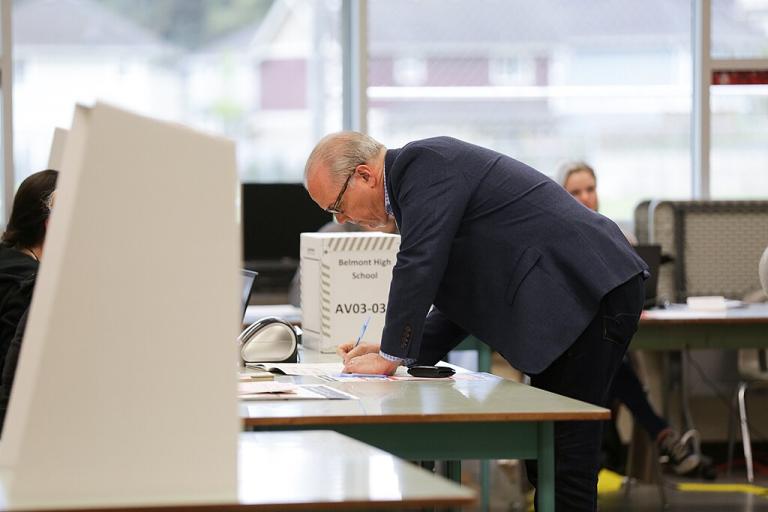But here are some thoughts about what will be happening today: No one knows what will happen. The battleground state math. Election apocalypse? None of the above? And don’t forget local and state elections.
No one knows what will happen.
Polls show a very close race. But, as we blogged about, 27% of those who tell pollsters that they will “definitely” vote never do, and 5% of those who say they definitely will not vote actually do. So while findings from polls might be representative, as always, it depends on who shows up to vote, and no one really knows which people that will be.
Donald Trump could be elected. Kamala Harris could be elected. Polls suggest that the election will be decided by a razor thin margin. Then again, either candidate could win in a landslide.
Keep in mind that the polls greatly undercounted Trump supporters in 2016, but they greatly undercounted Democrats in the midterm election of 2022.
Lately we have been blessed with divided government in which one party controls the presidency while the other party controls at least one house of Congress. We limited government types consider this a blessing because it prevents the winning president from fully enacting his or her agenda, thus limiting government by default.
Polls indicate that both the House of Representatives (currently controlled by the Republicans) and the Senate (currently controlled by the Democrats) will flip. Democrats will gain control of the House, and Republicans will gain control of the Senate. That would be a net gain for Republicans, since the Senate must sign off on cabinet members, federal judges, Supreme Court justices, other presidential appointments, and foreign treaties. Plus Senators are in office for six years.
Though we will likely have divided government, there is an outside chance of either party pulling a trifecta, winning both houses of Congress as well as the presidency. In which case, for better or worse, prepare for a flood of legislation and new programs.
UPDATE: Thanks to reader Tom Hering for pointing out this explanation of why we probably won’t get final results for awhile.
UPDATE: Here is a useful overview of when we’ll be likely to get reports from the various states, not only for president but for the important House and Senate races.
The Battleground State Math
The winner of the election will be the candidate who wins 270 electoral votes. Each state as a certain number of electoral votes calculated as the sum total of the number of their congressional representatives (the 2 senators that each state has + the number of House members as determined by population).
The so-called “blue” states have a history of always voting for the Democrat, while the “red” states always vote for the Republican. If both blue and red states vote according to expectation (and they may not), neither bloc has enough electoral votes to reach 270. So the election will hinge on the seven “swing states” or “battleground states” that have a history of being unpredictable.
These seven states, with their electoral votes) are the midwestern states of Pennsylvania (19), Michigan (15) and Wisconsin (10); the southwestern states of Nevada (6) and Arizona (11); and the southeastern states of Georgia (16) and North Carolina (16).
According to this analysis, if Harris wins Pennsylvania, Michigan, and Wisconsin, she wins the election with 270 votes exactly, even if Trump wins the other swing states, assuming she takes the blue states that voted for her and Biden in 2020.
If she loses Pennsylvania, she would need to pick up either Georgia or North Carolina and either Nevada or Arizona.
If Trump wins in Pennsylvania, Georgia, and North Carolina, he would win with exactly 270 electoral votes. If he wins Pennsylvania but loses one of those southern states, he could make up for that by winning any two of the remaining four states. Harris would need to win three of the remaining four.
Pennsylvania is key for both candidates. But if Trump loses Pennsylvania, he could make up for that by winning either Michigan or Wisconsin plus both North Carolina and Georgia plus one of the Western states.
And if one or the other candidate would win all of the battleground states, that would constitute a landslide.
Keep in mind that we probably won’t know the results tonight. Reportedly, improved practices will result in counting quicker than last time, but where elections are super-close, it may still take awhile to get results. That’s because the typical way of journalists “calling elections” based on preliminary counts and voter projections won’t work in those cases. The actual tabulation has to be complete, and that can take days. And that doesn’t count court challenges.
Election Apocalypse?
Both sides are warning that democracy will come to an end if their opponent wins. Harris has flat out called Trump a “fascist,” and Trump has called Harris a “communist.” So much of the electorate see this election in apocalyptic terms.
According to a Wall Street Journal poll, 87% of voters believe “America will suffer permanent damage if their candidate loses. Over half of Harris voters (57%) say they would be “frightened” if Trump wins, while almost half of Trump voters (47%) say they would be frightened if Harris wins. At least half of both sides say they expect violence after the election.
And both sides have already raised the possibility that the other side will cheat. Reportedly, 55% of Democrats, 58% of Independents, and 83% of Republicans are very or somewhat concerned that the election will be compromised.
None of the Above?
The nation is highly polarized politically, and yet many Americans do not find their views represented in either candidate. There is no moderate, no traditional conservative, no free-market, no fully pro-life, no devoutly Christian candidate. Those who usually pick their candidates according to such criteria must choose based on other factors now.
Those dissatisfied with both candidates can vote for one or the other anyway, picking the lesser of two evils or the one who might do less damage to your cause.
It’s also possible to choose “none of the above.” If you do that, you can vote for a third party or an independent candidate; write in a candidate; skip the presidential line on the ballot but vote in the other races; or not vote at all.
For a list of third party and independent candidates, along with where they will be on the ballot, go here. For single issue pro-life voters, there seems to be two and only two options (correct me if there are others):
(1) The traditionally conservative Constitution Party, whose candidates are longtime anti-abortion activist Randall Terry and black conservative activist Stephen Broden.
(2) The Christian Democratic Solidarity Party, whose candidates are Catholic activist Peter Sonski and stay-at-home mom Lauren Onak.
Roger Clegg defends casting such votes for someone who has no chance of winning, saying that it’s good for Americans to register their disapproval of both candidates and making a statement to that effect with their vote. However, he suggests different calculations if you live in a swing state. The margins are projected to be so close that every vote cast could end up determining the winner, not only in the state but in the national election. In those states (Arizona, Georgia, Michigan, Nevada, North Carolina, Pennsylvania, and Wisconsin), he counsels abstaining from symbolic votes.
In North Carolina, Democratic political action committees are buying ads supporting Constitution Party candidate Randall Terry in an effort to draw off votes from Trump. And in Georgia, Republican political action committees are buying ads supporting Green Party candidate Jill Stein in an effort to draw off votes from Harris.
Such cynical and insincere tactics put me off of the two party system even more, but I can see Clegg’s point that disaffected citizens in swing states should probably hold their noses and vote for the candidate they feel would be less bad. In these states, each voter may determine which one of those two, for better or worse, will become president. No pressure!
UPDATE: Matt Martens makes a provocative case for using your 1/160 millionth say so in the election to vote “none of the above” in his Mere Orthodoxy post The Problem with Voting for Candidates Who Promise to Do Evil.
Don’t Forget Local and State Elections.
It isn’t just the presidential race that is on the ballot. Don’t forget the local and state elections, some of which are also monumental, not only in determining which party holds Congress but which party holds state governments.
Abortion is on the ballot in Nebraska, Arizona, Colorado, Florida, Maryland, Missouri, Montana, Nevada and South Dakota. Of those, Nebraska, Florida, Missouri, South Dakota have pro-life laws that could be overturned.
Colorado, Nebraska, and Kentucky will be voting on school choice, whether or not to allow some form of state funding for private schools.
And California will vote on undoing some of the woke “criminal justice reforms” that have led to its crime sprees. It may be, in the words of the title of an article on the subject, that “Liberal California Has Reached Its Breaking Point on Crime.”
Photo: Horgan Casts His Ballot, BC NDP, CC BY 2.0 <https://creativecommons.org/licenses/by/2.0>, via Wikimedia Commons












